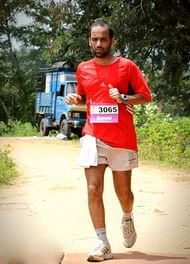Finishing a marathon is a great achievement in itself. But finishing an ultra? Now that’s no mean feat either.
Meet Ramani Easwaran, who works for IBM during the day, but at the break of dawn, runs 20-odd kms four to five days a week.
The 42-year-old was one of 17 Indians to finish the Comrades Marathon – the world’s largest and oldest ultramarathon race.
Run annually in the Kwazulu-Natal Province of South Africa between the cities of Durban and Pietermaritzburg, the direction of the race alternates each year between the “up” run (87 km) starting from Durban and the “down” run (89 km) starting from Pietermaritzburg.
The runners have 12 hours to finish the race (5:30am to 5:30pm). Not only this, they must also reach the five cut-off points en route within the required time to avoid getting disqualified. Ramani clocked 11:54:07 in this year’s ‘up’ run.
“Last year I finished it with three minutes to spare and this year with six odd minutes. It is really amazing to think that over 12 hours, one second can make the difference between a happy memory, and contentment as opposed to frustration and heart-ache when you have failed. But that is the point, the challenge, and that is the reason to run the race, regardless of your ability.
“And when you run such a long race, negative emotions run high. Fear, doubt, pain, hopelessness encourage a formula for defeat. You have to dig in deep to conquer those inner demons. The Comrades is an emotional and mental battle that you fight with yourself,” Ramani said about the event.
“The comrades is regarded as one of the toughest footraces in the world. The course is difficult with lots of ascents and descents and to top it the cut off times. Believe me, it is a trudge through a slough of despond, if you will.
“To come out successfully from what is the ultimate human race – as the tag line of the Comrades suggests – not once but twice has got to be one of the finest achievements of my life,” he added.
Running for 12 hours straight does have its health hazards and this year it was accentuated by the harsh weather conditions.
“The temperature was about 32 degrees, there were strong, hot headwinds blowing and you were running against it. After the half-way point, I saw people dropping like nine pins – from dehydration and other health related issues; hats off to the medical staff and volunteers, who worked ever so tirelessly.”
How it all started:
Ramani has been running for six years now with his first official marathon being the Bangalore Ultra in 2009 (50 Km). But he began running for a reason: “I started running to get over my parental bereavement.”
“It was a pretty tough period in my life, and running helped me get over that phase. But if you ask me today, why I’m still running, I don’t think I’ve figured it out. Maybe I’m addicted to it or maybe to test my limits, honestly, I do not know the answer.”
Asked about preparation for a race, Ramani said, “Honestly, I don’t prepare for a particular race. For me, running is sort of a second nature”
“I try to ideally log in about 90kms a week; I would love to run all seven days a week, if I can. Realistically, it usually boils down to about four to five days a week – almost a half marathon each running day. That’s how I run; I don’t train myself for a particular event,” he said about his training regime.
An expensive hobby:
Ramani has run 39 marathons so far, 49 is you add ten half marathons to the list. And to keep himself motivated, he brings in an element of craziness to his schedule.
“I’ll be running a marathon a month this season – Hyderabad (Aug), KTM (Sept), Chicago (Oct), New York (Nov), Chennai (Dec), Mumbai (Jan), Auroville (Feb).”
“Apart from South Africa, I’ve also run marathons in Singapore, Berlin, London, Tokyo and California. This is an expensive hobby I pursue,” he went on to add, rather amusingly.
Craziest thing to do:
When asked who he admires the most, Ramani was quick to reply. Bruce Fordyce, the South African ultramarathon athlete, who is best known for having won the South African Comrades Marathon a record nine times, eight of which were consecutive.
“He ran 30 comrades and retired last year, and I admire him because though he is a champion, he relates to a slow runner like me. He is also a very good motivational speaker.”
“I believe the Queen had visited South Africa and when she saw Bruce, all lean and thin, like most marathon runners are, she asked him, Mr. Fordyce, I thought runners are sturdy strong people but you look so thin?
“To which Fordyce replied, Your Majesty, to run you need three things: strong legs, strong heart and lungs and less of brain cells – as this is the stupidest thing to do. “
Ramani’s message for first-time runners is simple but also a heads-up in a way, “To me, running a marathon or an ultra for that matter, is the stupidest and craziest thing to do.”
“And to anyone who wants to take it up, he or she must take it gradually, have a set regime and be disciplined and dedicated.”
